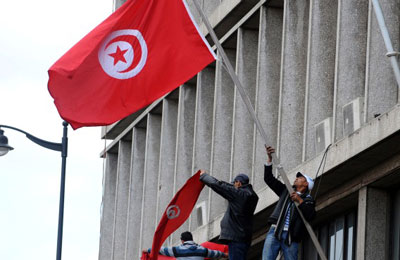
Tunisia to spend over $1bn to recapitalise banks
Tunis, June 17, 2013
Tunisia may spend over a billion dollars to recapitalise its state-owned banks as the government struggles to stabilise the economy after the 2011 revolution, Tunisian authorities have told the International Monetary Fund.
Plans for the rescue operation were described in a letter by the government to the IMF, which agreed earlier this month to lend Tunisia $1.74 billion over two years. The letter was published on Monday.
"A priority of the government will be to implement a series of measures to mitigate banks' weaknesses that were accumulated during years of favouritism, inadequate standards and weak banking supervision," the government said.
Strengthening Tunisia's banks is important to boost the economy; many businesses, particularly smaller ones, have reported difficulties in obtaining loans because of the economic and political instability that followed the revolution.
The North African country is struggling with rising inflation, a big external deficit and an uncertain outlook since secular dictator Zine al-Abidine Ben Ali was toppled in the first "Arab Spring" uprising two years ago.
An audit of the three state-owned banks which dominate the financial system is to be completed by December, and authorities aim to decide by mid-September whether to recapitalise or merge the banks, or reduce the state's holdings in them.
The government is preparing to "mobilise all necessary resources" to recapitalise the banks in the next two years, a process which could cost 2.6 percent of economic output or about $1.1 billion, the letter said.
It also said authorities would address non-performing loans in the tourism sector, which was hit hard by the revolution as foreigners stayed away. Loans to troubled tourism businesses account for over a fifth of the country's non-performing loans.
The government will set up an asset management company to buy bad tourism assets in exchange for state-guaranteed bonds, the IMF said.
Tunisia also pledged a range of other reforms, including changes to its costly and politically sensitive system of energy subsidies. A new formula for pricing fuel will be launched next year and leave gasoline close to international prices, it said.
The government said it would reform the tax system inherited by the pre-revolution government, which has been criticised for heavily favouring exporters and failing to encourage investment in the country's poorest regions.
Tunisia will announce by December a timetable for narrowing the gap between corporate tax rates on the onshore and offshore sectors, the letter said.
The government hopes these reforms will help it balance increased social spending in the wake of the revolution with the need to bring a widening budget deficit under control.
The letter predicted Tunisia's overall fiscal deficit would drop to 2.5 percent of gross domestic product by 2018, including bank recapitalisation, from an estimated 7.3 percent this year.
However, this will depend on solid economic growth which could be slowed by weakness in Europe, to which Tunisia is heavily exposed, and the approach of Tunisian elections expected towards the end of this year.
The IMF forecast Tunisia's current account deficit, which prompted it to seek its IMF loan, would stay high this year at 7.5 percent of GDP, falling to 5.1 percent in 2015.
To help conserve its foreign exchange reserves in the face of the deficit, the central bank said in the letter that it would take further steps to make the Tunisian dinar's exchange rate more flexible.-Reuters







